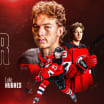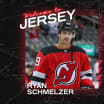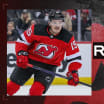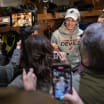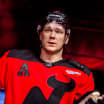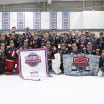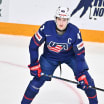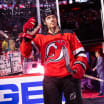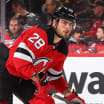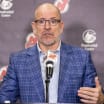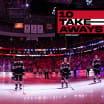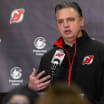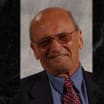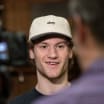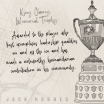"You've played both center and right wing. Which do you prefer? Where do you see yourself playing at the NHL level?"
"What type of learner are you? A visual learner? Can you see it on the board or do you need to see it on the ice?"
A collection of people gathered around a table and along the walls of a suite with their full attention at the head of the table. There prominently sits an 18-year-old prospect with the aspirations of being selected by the team in the upcoming NHL Draft.
"What type of player are you? How would you describe your game?"
"How much pressure do you put on yourself to play well?"
Throughout the NHL Combine held in Buffalo this week, the New Jersey Devils will meet with upwards of 60 prospects, 12 to 18 per day. And the team has roughly 20 minutes to interview each player.
Combine Part of the Process | DRAFT
The weeklong combine is another opportunity for NHL teams like the Devils to build on their prospect profiles for the draft
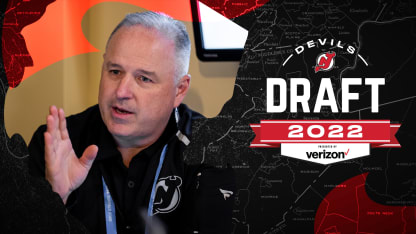
"Are there obstacles you've overcome in your life?"
"What areas of your game do you think you need to improve?"
The Devils, like the other 31 NHL teams, ask a barrage of questions. Some are related to the hockey side of a player, while others are based on the personality and psychology of a player.
"Interviews aren't exact. If someone gives a good interview that doesn't necessarily mean they're going to be the better player," said Mark Dennehy, the Devils Chief Amateur Scout. "But you can always glean something from meeting people and seeing how they handle certain questions.
"They might not tell you through their words. Often times, it's with their body language."
The Devils, who own the No. 2-overall selection, meet with prospects projected to go high in the draft - Shane Wright, Cutter Gauthier, Juraj Slafkovsky, Simon Nemec - as well as players projected to go much later down on the board.
"In the draft you're really looking at ceiling. They may not necessarily be the best guys now, but they'll end up being the best guys," Dennehy said. "A lot of those guys are already the best guys in their age group, but there are some that you don't know. You look at the Jesper Bratt's of the world and Yegor Sharangovich's of the world. There were a lot of players drafted ahead of them that are not playing in the NHL and are not as successful as those guys."
Dennehy is one among the many in the room asking questions. He's joined by other members of the scouting and development staff, as well as general manager Tom Fitzgerald.
"I like to ask right away, 'tell me who you are as a player. I've never seen you play. What do you do?'" Fitzgerald said. "Then they'll talk, and the scouts will jump in and continue the conversation from there.
"The scouts that are most familiar with the player lead the conversation."
For Fitzgerald and others, the Combine is their first chance to meet these players face-to-face and talk with them. But the truth is, the Devils have already done their due diligence and homework on every prospect before they walk through that door. Area scouts have already watched these prospects play and talked with them - on some occasions for several years - and have interacted with their coaches. It's a years-long process building a scouting profile.
"When I first took this job, the first thing 'Fitzy' said to me was that we have a great staff. And that's proven to be true," Dennehy said. "I can't sit here and take all the credit. Our regional scouts do great work. It's their job to make sure they're experts in their area. They know their coaches. Even though we're interview players here in this formal setting, we've interviewed a lot of these guys prior where it's less formal. If you get them early enough, they'll be less scripted."
And getting players in the informal setting is crucial. After all, in this day and age every prospect has been well coached by their agents and handlers on how they should answer the questions in these formal interview settings.
"There are kids that are really scripted. Their agents have done a really good job of helping them out," Fitzgerald said. "The authentic ones are genuine when answering questions. It's fun to see their personalities. Will that move a plyer up or down? Probably not. But at least you understand why somebody may play a certain way or why a coach talks about someone so highly, or not. But you see those personalities."
The interview process is one part of the equation. The other is the physical testing, which will take place over the weekend. Such things as strength, explosiveness and lung capacity are tested. Some of the players are more physicality developed than others and will perform better. But scouting is about projecting the future and not the now.
"What's their growth potential?" Dennehy said. "There are only a handful of guys in the draft that are physically ready to step in and play at the NHL level. The rest of these guys have to continue to develop and continue to grow. Do they have the type of frame to put that weight on?"
Every number and interview is part of the process. Their answers, their physical scores, their poise, their personalities, their play on the ice, input from teammates and coaches, everything throughout the years is put together into a giant book on each prospect. All of those details will be used when the Devils are on the clock when it comes time to make their selections July 7 and 8 at the NHL Draft in Montreal.
"We tabulate it all, package it together," Dennehy said. "As scouts our main job is we're information gatherers. We gather the information, we package it up and then we hand it to the decision makers to do what they're going to do. This is another step in the process."

